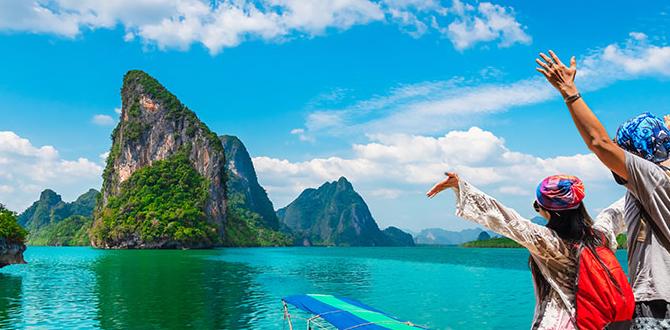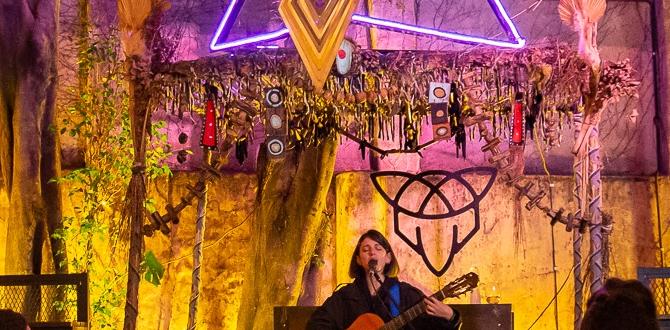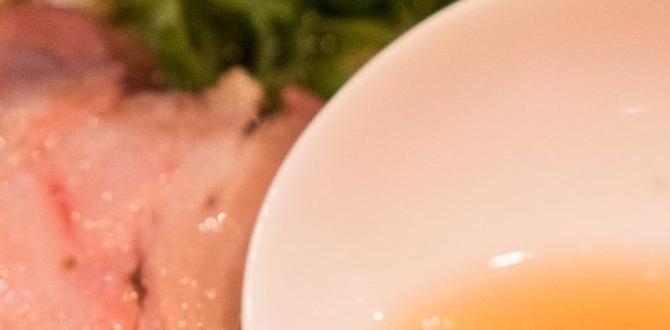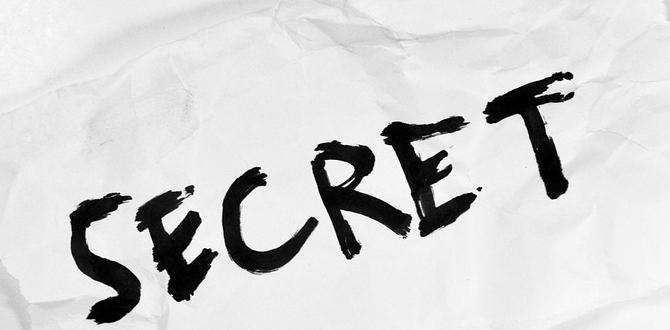Save money and explore Algeria with these smart tips! This guide offers easy ways to travel affordably, covering transport, food, and accommodation. Discover practical advice for a memorable, budget-friendly Algerian adventure without the stress.
Dreaming of exploring the vast landscapes and rich history of Algeria but worried about your wallet? You’re not alone! Planning an international trip can feel overwhelming, especially when you want to make every dinar count. But don’t let budget concerns hold you back. Algeria offers incredible experiences that are surprisingly accessible for budget travelers.
This guide is your roadmap to discovering Algeria’s wonders without breaking the bank. We’ll walk through simple, effective strategies to keep your costs down, from finding affordable stays and delicious cheap eats to navigating transport like a seasoned pro. Get ready to unlock an unforgettable Algerian journey, packed with value and fewer worries.
Why Algeria on a Budget?
Algeria, the largest country in Africa, is a treasure trove of diverse attractions. Imagine wandering through ancient Roman ruins, exploring the vibrant kasbahs of Algiers, or gazing at the endless Sahara Desert. While it might not be the first destination that springs to mind for budget travel, its affordability is one of its most appealing, yet often overlooked, features.
Compared to many Western European or even some North African tourist hotspots, Algeria offers a more authentic and less commercialized experience. This lack of mass tourism often translates into lower prices for accommodation, food, and local transport. It’s a destination where your travel budget can truly stretch, allowing for longer stays and deeper immersion into its culture.
For travelers looking for genuine cultural encounters, breathtaking natural beauty, and a sense of discovery, Algeria presents an exceptional opportunity. Whether you’re a solo backpacker, a family on an adventure, or someone seeking practical travel solutions for comfort and ease (like ensuring you have necessary personal care items, such as adult or child diapers for long journeys), Algeria can accommodate.
Smart Accommodation Choices
Finding a comfortable and affordable place to stay is key to any budget trip. Algeria offers several options that won’t drain your funds.
Hostels and Guesthouses (Maison d’hôtes)
While not as common as in some other regions, hostels are starting to appear in major cities like Algiers and Oran. They are a fantastic way to meet other travelers and keep costs extremely low. Look for places slightly outside the absolute city center for even better deals.
Maison d’hôtes, or guesthouses, are often family-run and offer a more intimate experience. They can be found at various price points, and negotiating a fair rate for a longer stay is often possible. These are great for those seeking a touch of local flavor and comfort, and can be particularly useful for families or individuals who require discreet and accessible personal care solutions, ensuring peace of mind throughout their stay.
Budget Hotels
Beyond the luxury resorts, Algeria has many simpler, family-run hotels. These often offer basic but clean rooms, sometimes with private bathrooms. Prices can vary significantly, but by looking at local booking sites or asking for recommendations upon arrival, you can find gems for a reasonable price. Always check reviews if possible, or walk through to gauge cleanliness and safety.
Renting Apartments
For longer stays or for families, renting an apartment can be a very economical option. Websites like Airbnb are available in major cities. This gives you more space, the ability to cook some of your own meals (a huge money-saver!), and a more local living experience. It also provides the privacy and convenience needed for managing personal care needs, ensuring comfort for all travelers.
Camping (Where Permitted)
For the truly adventurous and those heading towards desert regions, camping can be an option. While “wild camping” might be restricted in some areas for security reasons, there are organized campsites, particularly near tourist sites or in national parks. Always check local regulations and consider hiring a local guide for remote areas.
Savvy Transportation Hacks
Getting around Algeria doesn’t have to be expensive. Smart planning can significantly cut down your transport costs.
Intercity Buses
Buses are the backbone of public transport in Algeria and an incredibly budget-friendly way to travel between cities. Companies like SNTF (Société Nationale des Transports Ferroviaires) also operate buses, and there are numerous private companies. They are generally reliable, comfortable enough for most journeys, and incredibly cheap.
Booking tickets in advance is recommended, especially for popular routes or during peak travel times. You can usually buy tickets at the bus station. Schedules can sometimes be a bit fluid, so allow for some flexibility in your travel plans.
Trains
Algeria has an extensive rail network operated by SNTF. Trains are a comfortable and safe option for intercity travel, particularly for longer distances. While generally more expensive than buses, they offer a more relaxed journey with beautiful scenery. Booking tickets in advance is highly recommended, especially for first-class seats.
Key routes include Algiers to Oran, Constantine, and Annaba. Traveling by train can be a pleasant experience, offering a chance to rest and enjoy the passing landscapes. Just ensure you have all your essentials, and if you need to manage personal care needs discreetly, the privacy of a train compartment can be a real comfort.
Local Taxis and “Grands Taxis”
Within cities, “petits taxis” are readily available for short trips. Always agree on the fare before starting your journey, or ensure the meter is used if available. For intercity travel or longer distances within a region, “grands taxis” (shared taxis) are a common and affordable option. They operate on fixed routes and depart when full.
Be prepared to share a grand taxi with other passengers. While this adds to the local experience, it’s worth noting if personal space or comfort is a high priority, especially if you require easily accessible personal care items. However, they are a fantastic way to travel like a local and see more for less.
Domestic Flights
For very long distances, such as traveling from Algiers to Tamanrasset in the deep south, domestic flights with Air Algérie might be the only practical option. While not strictly a budget choice, booking in advance can sometimes yield reasonable fares, and it saves significant travel time. Compare flight prices with train or bus journeys to see if the time saved justifies the extra cost.
Delicious and Affordable Food
Algerian cuisine is flavorful and diverse. You can eat incredibly well here without spending much.
Street Food and Local Eateries
Don’t shy away from local eateries and street food stalls! This is where you’ll find the most authentic and cheapest meals. Look for places busy with locals – that’s always a good sign.
Must-try dishes include:
- Couscous: The national dish, often served on Fridays.
- Tajine: A slow-cooked stew, typically made with meat or vegetables.
- Chorba: A hearty soup, especially popular during Ramadan.
- Various grilled meats and sandwiches: Delicious and quick options.
A simple, filling meal from a local spot can cost as little as a few dollars.
Markets for Fresh Produce
Visiting local produce markets is a feast for the senses and a great way to save money. You can buy fresh fruits, vegetables, bread, and local cheeses to assemble your own picnics or light meals. This is also an excellent way to interact with locals and practice your Arabic or French.
Self-Catering
If your accommodation has kitchen facilities, buying ingredients from local markets and cooking some of your own meals is one of the most effective ways to reduce food expenses dramatically. Fresh bread, olives, cheese, and seasonal fruits make for fantastic and inexpensive lunches or dinners.
Budgeting Tips and Money Management
Managing your money wisely will ensure your Algerian adventure stays within budget.
Currency Exchange
The currency is the Algerian Dinar (DZD). It’s best to exchange money at official exchange bureaus or banks to get the best rates. ATMs are available in major cities and towns, but it’s wise to carry some cash, especially when traveling to more remote areas. Some establishment owners may offer better prices if you pay in cash.
Negotiate Prices
In local markets and with smaller, independent vendors, bargaining is expected. Be polite, friendly, and offer a reasonable price. Don’t be afraid to walk away if the price isn’t right – you might be called back with a better offer!
Free and Low-Cost Activities
Algeria offers plenty of activities that are either free or very affordable:
- Wander through historic medinas and kasbahs.
- Explore local markets (souks).
- Relax on beaches (free access to most public beaches).
- Visit public parks and enjoy local life.
- Hike in accessible natural areas (always check safety and permissions).
- Admire architecture and street art in cities.
Travel Off-Season
If your schedule allows, traveling during the shoulder seasons (spring and autumn) can often mean lower prices for flights and accommodation, plus fewer crowds.
Essential Packing for Comfort and Ease
Packing smart can save you money and enhance your travel comfort, especially if you have specific needs.
Lightweight and Versatile Clothing
Algeria has diverse climates. Pack layers that can be adapted to different temperatures.
Comfortable Walking Shoes
You’ll be doing a lot of exploring on foot, so comfortable shoes are a must.
Sun Protection
A hat, sunglasses, and sunscreen are essential, especially in warmer months and desert regions.
Modesty is Key
When visiting religious sites or more conservative areas, dress modestly. For women, this means covering shoulders and knees. Comfortable, loose-fitting clothing made from breathable fabrics is ideal.
Personal Care Essentials
Do you need to pack adult diapers or child diapers for peace of mind during travel, especially long trips on planes or buses? Absolutely! Bringing your preferred brands ensures you have what you need without relying on finding specific products in Algeria. Pack them discreetly and ensure they are easily accessible. Lightweight, high-absorbency options can make a big difference in comfort and confidence.
Consider purchasing travel-sized versions of toiletries. If you have specific medical needs or require other personal care items, pack enough for your entire trip, as availability may be limited outside major cities. This proactive approach prevents stress and ensures a more comfortable journey.
For travelers with children, having a supply of diapers, wipes, and change of clothes readily available is crucial. Understanding where you can easily access these supplies if needed is also important. Resources like UNICEF’s travel tips for families offer general advice on managing children’s needs while on the move.
Sample Algeria Budget Itinerary (7 Days)
Here’s a sample itinerary focusing on a few key areas, designed for budget travelers. Prices are estimates and can vary.
Day 1-2: Algiers (Algeciras) – The White City
- Accommodation: Hostel or budget hotel (approx. $20-40/night).
- Activities: Explore the Notre Dame d’Afrique, wander through the UNESCO-listed Kasbah (take a guided tour for context), visit the Museum of Antiquities and Islamic Art, enjoy a coffee with a view of the bay.
- Food: Local cafes, street food (sandwiches, crepes) (approx. $15-25/day).
- Transport: Petit taxis within the city (use meter or agree fare) or walk.
Day 3-4: Tipasa & Cherchell – Ancient Wonders
- Accommodation: Day trip from Algiers (saves on hotel costs) or a very basic budget hotel in Tipasa if preferred (approx. $20-35/night).
- Activities: Visit the Roman ruins of Tipasa (UNESCO World Heritage site), explore the Royal Mausoleum of Mauretania, visit the charming coastal town of Cherchell with its Roman amphitheater and museum.
- Food: Pack a picnic from Algiers markets or eat at a local restaurant near the sites (approx. $15-20/day).
- Transport: Grand taxi or local bus from Algiers to Tipasa (approx. $5-10 round trip).
Day 5-6: Oran – The Pearl of the Mediterranean
- Accommodation: Budget hotel or guesthouse (approx. $25-45/night).
- Activities: Visit the Santa Cruz Fortress for panoramic views, explore the modern Great Mosque of Oran, stroll along the Corniche, visit Place du 1er Novembre 1954.
- Food: Oran has a great food scene; try local seafood and traditional tagines at budget-friendly restaurants (approx. $20-30/day).
- Transport: Train or bus from Algiers to Oran (approx. $10-20 one way). Petit taxis within Oran.
Day 7: Oran Departure or Return to Algiers
- Enjoy a final Algerian breakfast, pick up any last-minute souvenirs, and head to the airport or train station for your departure or journey back to Algiers.
Estimated Daily Budget (excluding flights to/from Algeria): $50 – $80 per person per day. This estimate includes budget accommodation, food, local transport, and some modest activity fees.
Understanding Local Customs and Etiquette
Showing respect for local customs will greatly enhance your experience and interactions.
- Greetings: A simple “As-salamu alaykum” (Peace be upon you) is always appreciated.
- Dress Code: As mentioned, modest dress is important, especially for women.
- Hospitality: Algerians are known for their warmth and hospitality. If invited for tea or a meal, it’s polite to accept.
- Ramadan: If traveling during the holy month of Ramadan, be mindful of fasting. Eating, drinking, or smoking in public during fasting hours is frowned upon. Many restaurants may have reduced hours.
- Photography: Always ask permission before taking photos of people. Be discreet when photographing government buildings or military sites.
For more detailed cultural information, the U.S. Department of State’s Algeria page can offer insights on local laws and customs: U.S. Department of State – Algeria.
Is Algeria Safe for Budget Travelers?
Safety is a primary concern for any traveler, and Algeria is generally considered safe for tourists, especially when sensible precautions are taken. Like any country, there can be areas with higher crime rates, particularly in large cities after dark.
General Safety Tips:
- Stay Aware: Be aware of your surroundings, especially in crowded areas.
- Valuables: Keep valuables secure and avoid displaying expensive items.
- Solo Travel: If you are a solo female traveler, dressing modestly and being mindful of your surroundings is advised, as in many countries. Consider joining group tours or using reputable guides for excursions in remote areas.
- Documentation: Keep copies of your passport and important documents separate from the originals.
- Emergency Contacts: Have emergency contact information readily available.
Algeria’s tourism infrastructure is developing, and local authorities often provide good support for visitors. Engaging with reputable tour operators can also offer an added layer of security and local knowledge.
Frequently Asked Questions (FAQ)
Q1: What is the most budget-friendly way to travel between cities in Algeria?
The most budget-friendly way is by intercity bus. Private bus companies and public operators run extensive networks connecting most major towns and cities for very low fares.
Q2: Can I find affordable accommodation in Algeria if I’m not staying in hostels?
Yes, many budget hotels and family-run guesthouses (maisons d’hôtes) offer clean and basic rooms at very reasonable prices. Renting an apartment via platforms like Airbnb can also be economical, especially for longer stays or groups.
Q3: How much should I budget per day for traveling in Algeria?
A realistic budget for a budget traveler in Algeria is around $50-$80 USD per person per day. This covers basic accommodation, local food, and intercity transport. It can be lower if you self-cater more and focus on free activities.
Q4: Is it safe to eat street food in Algeria?
Generally, yes, if you choose busy stalls with good hygiene practices. Look for where locals are eating; this is usually a good indicator of quality and safety. Stick to freshly prepared items.
Q5: Do I need to speak French or Arabic in Algeria?
While Arabic is the official language, French is widely spoken, especially in business and by older generations. In tourist areas, some English might be understood, but knowing





